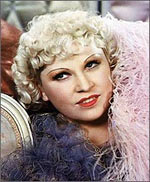|
Goodness
Had Something to Do With It
By Sarah "Dixie" Feldman
 |
| Photo
Courtesy Corbis.com | |
The author of many
plays, films, and an enduring legacy of bon mots, ultimately Mae West's best invention
was: Mae West. It
may be hard for modern minds to conceive of how revolutionary Mae West was in
her heyday. Only a decade after women's suffrage, Mae wrote and starred in plays
and movies about women who lived for sex — and became one of the country's
biggest box office stars while doing it. Mae West was one of the first 20th-century
women to eroticize her autonomy, and make us laugh while she did it.
"When
I'm good, I'm very very good. But when I'm bad, I'm better."
Without precedent, Mae West created a completely revolutionary
female protagonist who was strong, smart, self-sufficient and
capable — and clearly interested in sex. Mae expressed
her interest in a way that had previously been the sole territory
of men. Mae wanted sexual pleasure — and perhaps most incendiary
— went unpunished for her predilections. She was a carnal
connoisseur who not only lived to tell the tale, but was steadfastly
triumphant. West reveled in her own sexual power and forged
an identity that wedded independence and sexuality in away that
was original and entertaining.
"I
take [sex] out in the open and laugh at it."
When Mae busted
(literally) into the public eye in the late 1920s, females generally fit neatly
into two categories: good and bad. And as Mae might have pointed out, the good
were very good, and the bad, well, they were even better. Until Mae came sashaying
on to the scene, cinema heroines did not have sex, and those screen vixens who
did — golddigging vamps or Mata Haris looking to abscond with the enemy's
secret plans — always pursued sex as a means to an end. But Mae left her
audiences with no doubt that for her, sex itself was a prize to be pursued. West's
offscreen life was as anomalous as her onscreen persona. Born in 1893, Mae worked
in vaudeville as a girl, performing lascivious dances and peppering her act with
the double entendres ("I wouldn't touch him if he had a ten-foot pole")
that would soon become her trademark. Married at 18, she quickly discovered that
marriage did not agree with her ("Marriage is a fine institution -- if you
want to live in an institution") and lived as a bachelor for the remainder
of her life. "It
is better to be looked over than overlooked."
Taking her career
into her own hands, Mae began writing plays — including the tersely and aptly
titled, Sex, in 1926. Later, in an era when miscegenation was still perhaps
the most potent social taboo, Mae wrote a book (and later starred in a play) whose
protagonist, Babe, becomes a prostitute for fun and actively pursues a black boxer.
Not a social reformer, Mae's Babe is clearly interested in her heavyweight for
one thing and one thing only. "To
err is human, but it feels divine."
Though criticized for her
"corrupting influence" and jailed periodically for obscenity, the resulting
publicity and Broadway success brought Mae to Hollywood's attention. Starring
in nine films, she had writer's credit on five and consistently wrote her own
lines in all her movies. Two of West's films, She Done Him Wrong and I'm
No Angel, are generally credited with saving Paramount Studios from bankruptcy
at the height of the Depression. Unfortunately, her ongoing battles with censors
ending up diluting her films and Mae eventually abandoned films as a creative
outlet, returning to the stage and new popularity as a somewhat campy cabaret
performer.
But to
remember Mae West as a kitsch queen would be to ignore her unique
and inspiring contribution as a bona fide auteur. If she hadn't invented
herself, we would have had to invoke her ourselves, because Mae West's
potency as an icon and feminine philosopher would be sorely missed.
Some may have thought Mae was a bit "too much," but as West
once quipped, "Too much of a good thing can be wonderful."
This article originally appeared on www.oxygen.com.
Copyright 2001 Oxygen Media.
|










